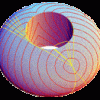Mathematics Department
The newly formed Mathematics Department at Berkeley Lab is comprised of three groups: Software Design for Experimental Science, Mathematics for Experimental Data Analysis, and the Mathematics Group. Together, these groups develop an integrated, cross-disciplinary approach to bringing state-of-the-art mathematics to challenging problems across the Department of Energy.
Our work spans multiple areas of investigation:
- Complex physics simulations, including those from fluid mechanics, aerodynamics, and industrial manufacturing, making use of a variety of techniques, such as discontinuous Galerkin solvers, level set methods, and projection methods.
- Inverse problems arising from data science and experimental facilities, including tomography, free-electron lasers, x-ray photon correlation spectroscopy, image understanding through computer vision and machine learning, and autonomous self-driving experiments, making use of a variety of mathematical approaches, including computational harmonic analysis, correlation methods, Mixed-Scale Dense convolution neural networks, statistical methods, and dimensional reduction.
- Software design and workflow protocols for efficient delivery and execution of algorithms across a spectrum of computing platforms.
Department Head: James Sethian
Software Design for Experimental Science
The Software Design for Experimental Science Group's mission is to invent, design, and implement software that delivers state-of-the-art algorithms to advance the analysis of experimental data coming from DOE facilities. Read More »
Math for Experimental Data Analysis
The Mathematics for Experimental Data Analysis Group researches, invents, designs, and implements state-of-the-art new mathematics and algorithms to advance the analysis of experimental data coming from Department of Energy (DOE) facilities, with a particular emphasis on synchrotron light sources. Read More »
Mathematics Group
The Mathematics Group at LBNL develops new mathematical models, devises new algorithms, explores new applications, exports key technologies, and trains young scientists in support of DOE. Read More »













